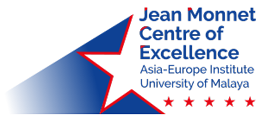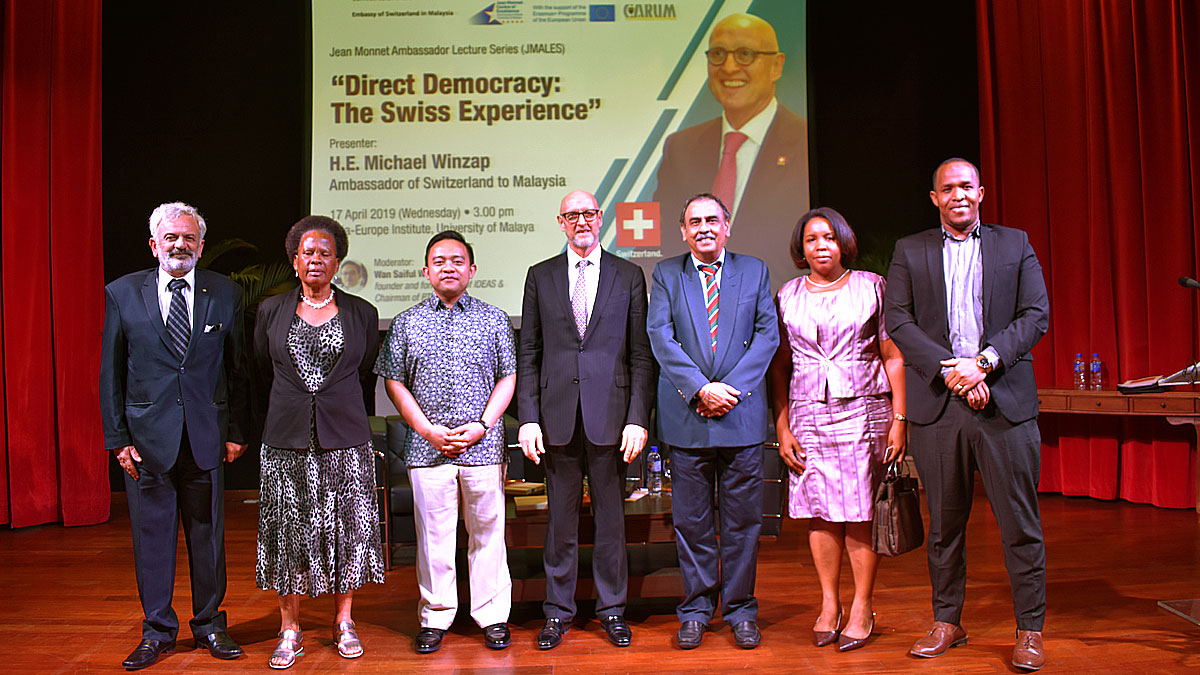
REPORT: JEAN MONNET AMBASSADOR LECTURE SERIES (ALES) 2019
Date: 17th April 2019 (Wednesday) • 3.00pm • Asia-Europe Institute (AEI), University of Malaya
As part of a two-week exhibition on “Direct Democracy” jointly organised by the Embassy of Switzerland in Malaysia and the Asia-Europe Institute, a lecture was presented by His Excellency Michael Winzap, the Ambassador of Switzerland to Malaysia. This lecture and Q&A session was part of the Jean Monnet Ambassador Lecture Series (ALES). It was held at the institute on 17th April 2019 from 3pm to 5pm. The event was attended by embassy representatives from various countries, government officials, academics, representatives from the media, representatives from NGOs and students.
 (from left to right) Mr. Sofian Al Khaldi (First Counsellor, Embassy of the State of Palestine), H.E. Samkelisiwe Isabel Mhlanga (High Commissioner of South Africa), Mr. Wan Saiful Wan Jan, (moderator, Chairman of PTPTN), H.E. Ambassador Michael Winzap, Dr. Jatswan Singh (Deputy Executive Director (Academic) of AEI) and H.E. Ibete Fernandez Hernandez (Ambassador of Cuba)
(from left to right) Mr. Sofian Al Khaldi (First Counsellor, Embassy of the State of Palestine), H.E. Samkelisiwe Isabel Mhlanga (High Commissioner of South Africa), Mr. Wan Saiful Wan Jan, (moderator, Chairman of PTPTN), H.E. Ambassador Michael Winzap, Dr. Jatswan Singh (Deputy Executive Director (Academic) of AEI) and H.E. Ibete Fernandez Hernandez (Ambassador of Cuba)In line with the exhibition, H.E Ambassador Michael Winzap delivered a lecture entitled “Direct Democracy: The Swiss Experience.” He started by expressing his gratitude to the institute and attendees for their support of the exhibition and willingness to learn about the Swiss experience. The lecture took the audience on a historical overview of how Switzerland’s geography, history, demography, culture and political organisation was shaped since 1291, when the three cantons first came together. Switzerland was fondly referred to as the heart of Europe, with friendly relations and integration of cultures with neighbouring nations. The multicultural society of the country was reflected through its demography, with 25% foreign residents and three official languages. Moving on to political instruments, H.E Ambassador Michael Winzap accentuated that three instruments defined the system of direct democracy in Switzerland: popular votes, optional referendums and mandatory referendums. These were the instruments utilised to allow the Swiss people themselves to decide on changes in the nation’s constitution and legal frameworks. To the audience’s surprise, he explained that the executive government consisted of seven ministers with equal power who rotationally take on annual terms to be President. This was put in place in order to assure that there would be decentralised power and better representation in the country.
H.E Ambassador Michael Winzap then went on to emphasise: “no, you don’t have to vote for everything.” He highlighted the Swiss culture of compromise where popular vote constitutes to what is right and winning is fair because voters appropriately understand the subject, advantages, and consequences of the decisions being voted on. This was displayed using a small information booklet regarding a recent bill that had been voted on. He then went on to explain how Switzerland handled foreign policy, especially with the European Union, whom they share hundreds of trade agreements and juggle these complex trade relations without membership. As often noted by the international community, H.E Ambassador Michael Winzap attributed the country’s safety from war caused destructions in the past on the country’s strong stance of neutrality. Furthermore, he spoke proudly about the economic success of the country albeit their small workforce and limited resources. They are considered the 20th most wealthy nation and have a strikingly high value added economy, all while being the country with the second longest life span, after Japan. By the end of this lecture, the audience was visibly impressed with Switzerland’s systems.
Following this, the moderator of the event, Mr Wan Saiful Wan Jan gave some commentary on the lecture. He pointed out that Switzerland’s practice of direct democracy stemmed from a long history of maturation in systems creation, which resulted in lower voter turnout rates in more developed democracies compared to newer ones like Malaysia. The key lesson he emphasised was that even with a diverse and multicultural population, if a democracy develops towards the right direction, political differences can be better dealt with in a peaceful manner. He then opened the floor to the audience. Questions raised revolved around the objectiveness of information shared before voting, comparisons with the Brexit referendum and the adoptability of the Swiss system. In summary of this Q&A session, His Excellency Michael Winzap continuously mentioned that change takes time and successful systems can never be completely exported. The Swiss Government’s role is to respect the choices of the people and make the appropriate adjustments to compromise with those decisions. This experience is heavily based off a long historical timeline and should be used by other nations’ as a source of inspiration. There is no specific aspect that of the Swiss system that can be considered better than others because as His Excellency Michael Winzap said: “The Swiss system works like a Swiss watch, taking one thing out would make the entire thing collapse.”
In conclusion, he thanked the audience for their excellent questions and attentiveness. Lastly, he reminded everybody that it is a balance of maturity, healthy debate and the popularisation of the right values in society that makes a succeessful democracy.
In this public lecture, Mr Wan Saiful Wan Jan, Chairman of PTPTN, was the moderator and Dr. Nurliana Kamaruddin was the master of ceremony.
Prepared by Charis Yeap Khai Leang.
Last Update: 15/12/2021